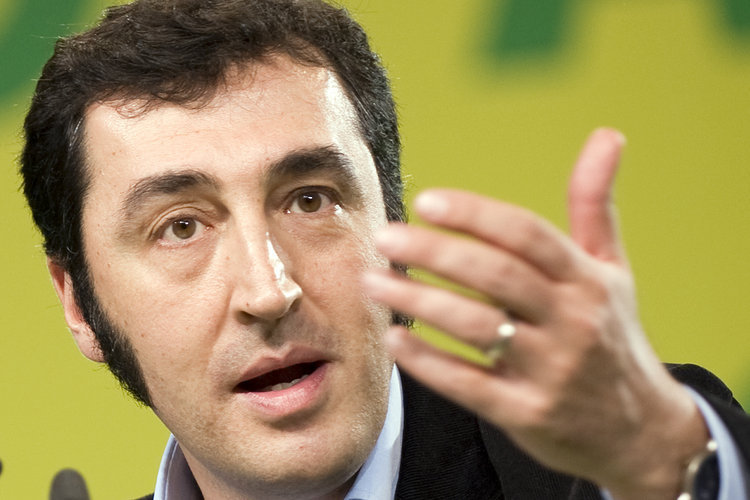
The Circassian Question May Acquire a Tangible European Dimension
Publication: Eurasia Daily Monitor Volume: 8 Issue: 142
By:

On July 12, the leader of the German Green party Cem Oezdemir resigned from the board of trustees of Germany’s Quadriga fund. Oezdemir was one of the first public figures to protest Quadriga’s plan to give an award to Russian Prime Minister Vladimir Putin. He conceded that Putin had contributed to stabilizing German-Russian relations but expressed his doubts over the Russian leader’s democratic credentials (www.oezdemir.de, July 12). Eventually, after a wave of public protests in Germany, the 2011 Quadriga award ceremony was canceled. As one German observer pointed out, “Germany’s political and intellectual classes are completely divided over how to perceive present-day Russia and what Germany’s policies toward the country should be.” The humiliation for Putin and Russia was made even worse since Quadriga announced the cancellation of the award ceremony just one day before the Petersburg Dialogue, a high-profile German-Russian forum that took place in Germany (https://www.dw-world.de/dw/article/0,15249959,00.html).
The Circassian analyst Sufian Zhemukhov argued that German Green party Co-Chairman Cem Oezdemir acted not according to the logic of German-Russian relations, but as a Circassian politician: “Bearing in mind his Circassian origin, it is easy to understand why he voted against [the award to Putin]. Quadriga is an award to commemorate the unification of Germany and the German nation. As a Circassian, Oezdemir voted against awarding the Russian side because he assumed that the Russians were preventing the unification of his people” (https://echo.msk.ru, July 21).
The Circassians historically inhabited the whole northwestern Caucasus, including the Black Sea coast. During the Russian conquest of the Caucasus in the nineteenth Century, the Circassians were exterminated and deported from their homeland to the Ottoman Empire on a mass scale. An estimated 90 percent of the Circassian population was killed, died of artificially imposed hardships or were sent into exile. After Moscow won the right to hold the 2014 Winter Olympics in Sochi, which was once Circassian land, the Circassian diasporas worldwide and in the North Caucasus started to campaign to attract the world’s attention to their plight. One of the principal demands of the Circassians is for Moscow to affirm the right of the exiles’ descendants to return to their historic homeland in the North Caucasus. So far, the Russian government has been very reluctant to allow any sizable immigration of the Circassians.
According to Zhemukhov, the Circassian cause may now acquire a leader in the person of Cem Oezdemir, who could potentially unite different groups of Circassians to advocate for their rights more effectively. Since 2006, Oezdemir has organized Circassian Days in the European Parliament. He did not oppose Russia before: on the contrary, Zhemukhov notes, the leader of the German Greens did not support the calls made by Circassian organizations in 2006 and 2008 for the European Parliament to recognize the Circassian “genocide.” Oezdemir supported Russia during the Russian-Georgian war in 2008, promoting Abkhaz representatives in Europe.
Zhemukhov alleged that the Russian government was behind the surprise condemnation of the Circassian Days in the European parliament by pro-Moscow Circassians in December 2010. Zhemukhov concluded that Moscow apparently hoped to use the Circassian Days in the European Parliament as a space for pro-Russian rallies, but Oezdemir refused to cooperate and was denounced by the pro-Moscow Circassian loyalists in retaliation. Oezdemir had, for the first time, positioned himself as an anti-Russian politician. He could organize an anti-Russian alliance in Germany or back recognition of the Circassian “genocide” in the European Parliament, becoming the champion of Circassian interests (https://echo.msk.ru, July 21). Oezdemir reportedly stated during a visit to Maykop, Adygea in the Northern Caucasus in 2007: “I am proud of that I can consider myself not only a deputy from Germany and Turkey, but also from Adygea” (https://www.natpress.ru/index.php?newsid=3063). However, being essentially a German politician, Oezdemir is likely to consider his posture in Germany above all and act vigorously in support of the Circassian cause only if his actions do not contradict Germany’s interests.
Meanwhile, Circassian leaders in the North Caucasus are under pressure. On July 19, unknown assailants attacked Ibragim Yaganov in Nalchik, Kabardino-Balkaria. Yaganov stated in an in interview for the Kavkazsky Uzel (Caucasian Knot) website that he knew who was behind the attack, but stopped short of naming them. Yaganov stated that the main issue in Kabardino-Balkaria is the lack of public safety. “If the authorities of the republic found some form of dialogue, if they did something about the glaring injustices, the protest reaction, which takes on abhorrent forms, would die out,” Yaganov said (www.kavkaz-uzel.ru, July 22). Various leaders in the North Caucasus all say essentially the same thing: that the lack of democratic participation is the main destabilizing factor in this volatile region.
Adygea is on the brink of political changes. Politics in this tiny republic, which has a population of under half-a-million, are of special importance to Moscow. Adygea is the North Caucasian republic closest to the sites of the 2014 Sochi Olympics. Besides that, it is home to a number of flamboyant Circassian leaders. The head of the republic, Aslan Tkhakushinov, has been very ill since he underwent heart surgery in May 2011, and it is believed he will soon step down. His nephew, Murat Kumpilov, is the acting head of the republic now and is believed to be a strong contender in the scramble for power (https://freedom-info.ru/, July 1). However, Moscow is likely to make sure Adygea is ruled by an utterly loyal and meek person, so it is probable that an ethnic Adygean from Moscow or the neighboring Russian-speaking region of Krasnodar will be appointed as the new head of government.
Circassian activism has the potential to force Moscow to adjust its policies in the North Caucasus. At the same time, allowing sweeping changes in the North Caucasus, such as ending the region’s isolation from the outside world and introducing popular elections, appears to remain off Moscow’s agenda.




